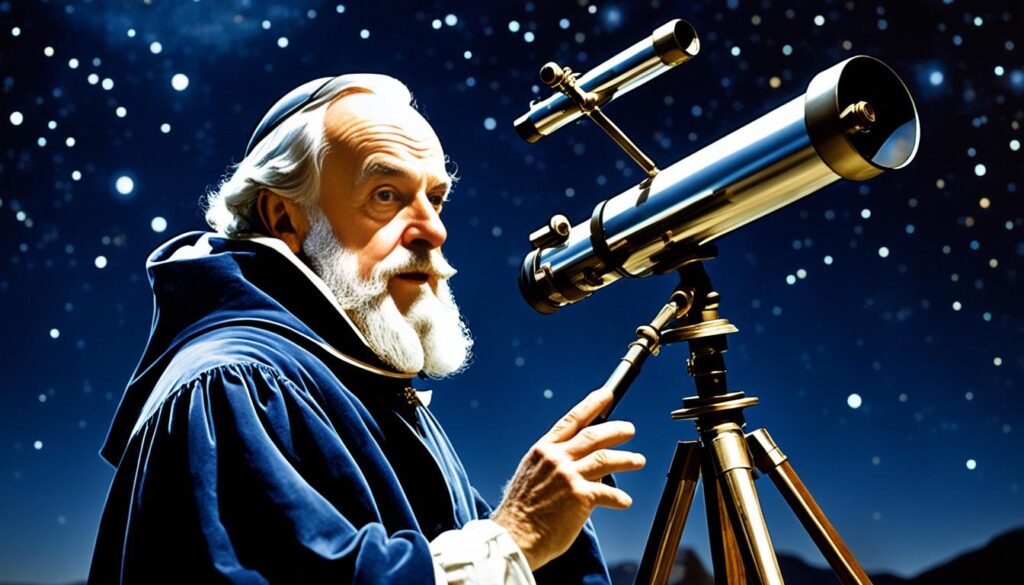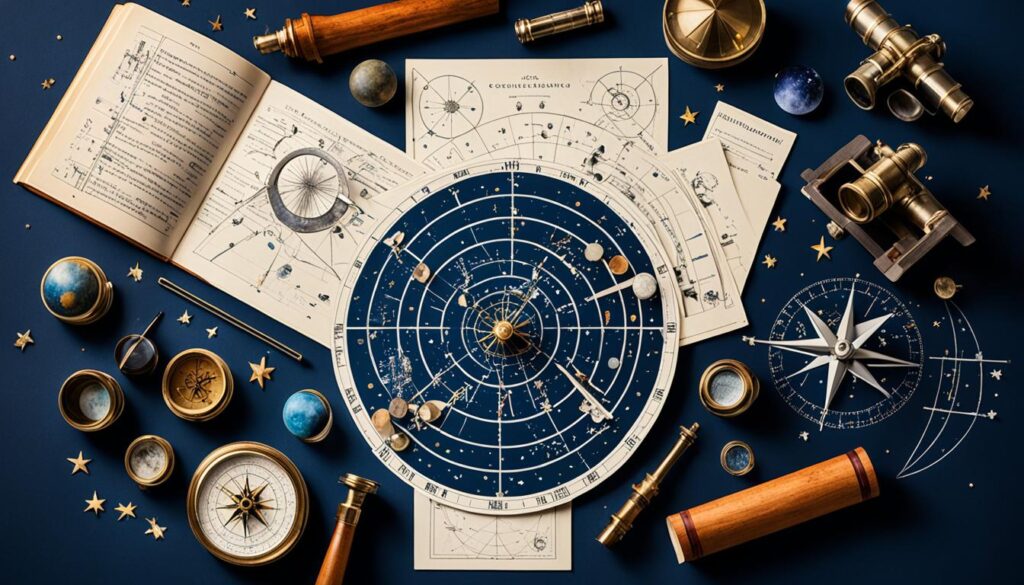Are you ready to embark on a celestial journey and explore the wonders of astronomy? In this comprehensive guide, we will delve into the captivating world of space exploration, from the study of celestial bodies to the fascinating field of astrophysics. Get ready to discover the mysteries of the universe, witness astronomical events, and learn how to enhance your stargazing experience with a telescope. Let’s unlock the secrets of the stars and dive into the captivating realm of cosmology.
Key Takeaways:
- Astronomy offers a fascinating exploration of the universe and celestial bodies.
- Astrophysics allows scientists to study the physical properties and processes of celestial objects.
- A telescope is a powerful tool that enhances our understanding of the cosmos.
- Astronomical events provide unique opportunities to witness celestial marvels.
- Notable figures such as Galileo, Copernicus, and Hubble have made significant contributions to astronomy.
The Basics of Astronomy
Before embarking on a journey through the vastness of the universe, it’s important to grasp the basics of astronomy. By understanding the fundamentals of this scientific field, you’ll be able to appreciate the wonders of celestial bodies, engage in stargazing activities, and explore the fascinating realm of cosmology.
Astronomy is the study of celestial bodies, which include stars, planets, galaxies, and more. It involves observing, analyzing, and comprehending the vastness of the universe. Through the lens of astronomy, we gain insights into the mysteries that lie beyond our planet Earth.
Stargazing is a popular activity among astronomy enthusiasts. It provides a unique opportunity to marvel at the beauty of the night sky and observe celestial bodies in all their splendor. By venturing outdoors and gazing at the stars, you’ll gain a deeper appreciation for the vastness of the universe.
Cosmology, on the other hand, explores the origin, evolution, and structure of the universe. It seeks to understand the fundamental laws that govern the cosmos. From the Big Bang theory to the formation of galaxies, cosmology unravels the secrets of our universe, offering insights into its past, present, and future.
Whether you’re a beginner or a seasoned astronomy enthusiast, this section will provide you with a solid foundation to embark on your cosmic journey. Through a deeper understanding of celestial bodies, the universe, stargazing, and cosmology, you’ll be better equipped to explore the wonders of astronomy and appreciate the magnitude of our ever-expanding universe.
Exploring the Universe
With the help of a telescope, you can delve deeper into the universe and observe celestial bodies up close. Telescopes act as powerful tools, enabling astronomers to study distant planets, stars, and galaxies. Whether you’re a beginner or an experienced stargazer, exploring the cosmos through a telescope is an awe-inspiring experience.
There are different types of telescopes available, each with its own capabilities. Refracting telescopes use lenses to gather and focus light, providing crisp images of celestial objects. Reflecting telescopes, on the other hand, utilize mirrors to gather and focus light, making them suitable for observing fainter objects.
Astrophysics is a fascinating field that combines physics and astronomy to explore the physical properties and processes of celestial objects. By studying the behavior of stars, galaxies, and other cosmic phenomena, astrophysicists uncover the secrets of the universe and contribute to our understanding of its vastness.
“The universe is a grand symphony, and telescopes are our instruments. They allow us to listen to the cosmic melodies and unravel the mysteries of the cosmos.” – Dr. Jane Martinez, Astrophysicist
When you peer through a telescope, you’re not just observing distant objects; you’re witnessing the breathtaking beauty of the universe itself. The vastness of space, the intricate details of galaxies, and the sparkling brilliance of stars all come into view, leaving you in awe of the cosmic wonders that surround us.
Ready to embark on your journey of exploration? Let’s dive into the next section and discover the incredible astronomical events and phenomena that captivate astronomers and stargazers alike.
Astronomical Events and Phenomena
The universe is a treasure trove of breathtaking events and phenomena that spark the imagination of astronomers and stargazers alike. From meteor showers to eclipses, comets, and supernovae, these celestial occurrences grant us unique opportunities to witness the wonders of the cosmos. Get ready to mark your calendars and prepare for an awe-inspiring journey through some of the most notable astronomical events and their significance.
Meteor Showers: A Celestial Spectacle
One of the most captivating sights in the night sky, meteor showers occur when Earth passes through the debris left behind by comets. As tiny particles collide with our atmosphere, they create streaks of light known as shooting stars. Events like the Perseids and the Geminids offer unforgettable displays, with hundreds of meteors streaking across the sky every hour.
Eclipses: Celestial Alignments
An eclipse is a mesmerizing alignment of celestial bodies that temporarily obscures sunlight or moonlight. A solar eclipse occurs when the Moon passes between the Earth and the Sun, casting its shadow on our planet. During a lunar eclipse, Earth positions itself between the Sun and the Moon, causing the Moon to darken as it enters the Earth’s shadow. Both solar and lunar eclipses offer a mesmerizing spectacle that awakens our sense of wonder.
Comets: Visitors from the Far Reaches
Comets are celestial travelers that journey through our solar system, often originating from the distant Oort Cloud. These icy bodies develop stunning tails as they approach the Sun, releasing gas and dust particles that reflect sunlight. Famous comets like Halley’s Comet make periodic appearances, captivating stargazers with their luminous beauty and enigmatic nature.
“Comets, like cats, have tails,
And tails have occasionally been stepped on.”
Supernovae: Stellar Explosions
Supernovae are extraordinary cosmic events that mark the explosive end of a massive star’s life. During a supernova, the star releases an immense amount of energy, outshining entire galaxies for a brief period. These dazzling displays not only illuminate the surrounding space but also provide valuable insights into the lifecycle of stars and the creation of elements.
- Experience the grandeur of astronomical events that have fascinated humanity for centuries.
- Marvel at the streaks of light during meteor showers.
- Witness the celestial dance of solar and lunar eclipses.
- Be enchanted by the luminous tails of visiting comets.
- Delve into the explosive brilliance of supernovae.
The universe invites you to embrace the beauty and wonder of these astronomical events. Whether you’re a seasoned stargazer or new to the world of astronomy, these celestial marvels will leave you in awe of the vastness and splendor of the cosmos.
Notable Figures in Astronomy
Throughout history, there have been influential figures who have shaped our understanding of the universe. Their contributions have paved the way for advancements in astronomy and expanded our knowledge of the cosmos.
Galileo Galilei
Galileo Galilei, an Italian astronomer and physicist, is often referred to as the “father of observational astronomy.” He made significant discoveries using his telescope, including the observation of the moons of Jupiter and the phases of Venus. Galileo’s observations provided concrete evidence for the heliocentric model proposed by Nicolaus Copernicus, challenging the widely accepted geocentric view of the universe.

“In questions of science, the authority of a thousand is not worth the humble reasoning of a single individual.” – Galileo Galilei
Nicolaus Copernicus
Nicolaus Copernicus, a Polish astronomer and mathematician, formulated the heliocentric model of the universe. His book, “De Revolutionibus Orbium Coelestium,” presented a sun-centered view of the solar system, challenging the prevailing belief in Earth’s central position. Copernicus’ work laid the foundation for modern astronomy and sparked a scientific revolution.
Edwin Hubble
Edwin Hubble, an American astronomer, played a pivotal role in our understanding of the cosmos. He discovered that the universe is expanding, providing evidence for the Big Bang theory. Hubble’s observations of distant galaxies using the Hubble Space Telescope revolutionized our understanding of the vastness and age of the universe. His work laid the groundwork for the field of observational cosmology.
These notable figures in astronomy have left an indelible mark on our understanding of the universe. Their discoveries and contributions continue to inspire future generations of astronomers, pushing the boundaries of our knowledge.
Captivating Discoveries in Astronomy
The realm of astronomy is an exciting and ever-evolving field, constantly unveiling new discoveries that enhance our understanding of the vast universe. Astronomers, with their tireless dedication, continue to push the boundaries of knowledge and uncover captivating secrets.
One such remarkable discovery is the detection of exoplanets in far-off star systems. These distant planets, orbiting stars beyond our solar system, have opened up new possibilities for the existence of life beyond Earth. The search for habitable exoplanets has ignited our imagination and sparked a renewed interest in exploring the cosmos.
Another mind-boggling revelation is the identification of black holes. These cosmic entities, with their immense gravitational pull, trap everything, including light, making them invisible to the naked eye. Through advanced telescopes and groundbreaking scientific methods, astronomers have managed to spot and study these enigmatic objects, deepening our understanding of the universe’s mysterious workings.
Furthermore, the exploration of distant galaxies has provided astronomers with a glimpse into the past. As light travels through space, it carries information about the early stages of the universe. By examining the light emitted by galaxies billions of light-years away, scientists can unravel the mysteries of cosmic evolution and the formation of celestial structures.
“The exploration of space not only reveals the wonders of the universe but also expands the boundaries of human knowledge and imagination.”
These captivating discoveries in astronomy have far-reaching implications for our understanding of the stars, planets, galaxies, and the vast universe itself. They inspire us to delve deeper into the mysteries that surround us and fuel our quest for knowledge.
Exploring the Unknown
With each new breakthrough, astronomers inch closer to unraveling the secrets of the cosmos. The pursuit of knowledge within the field of astronomy continues to ignite our curiosity and astonish us with its revelations.
Join us in the next section, where we will explore the myriad of resources and tools available to aid in your astronomical journey, from educational websites to advanced apps and immersive planetarium experiences.
Astronomy Resources and Tools
As you embark on your astronomical journey, you’ll find a wealth of resources and tools at your fingertips. In the digital age, technology has made it easier than ever to explore the wonders of the cosmos. Whether you’re a beginner stargazer or an experienced astronomer, these resources can enhance your understanding and enjoyment of astronomy.
Astronomy Apps
Astronomy apps are a great way to navigate the night sky and identify celestial objects. They provide real-time sky maps, detailed information about stars and planets, and even notifications about upcoming astronomical events. Here are some of the top astronomy apps:
- Star Walk: This app allows you to point your smartphone or tablet at the sky and instantly identify stars, constellations, and planets. You can also explore the night sky in augmented reality mode.
- SkySafari: With SkySafari, you can simulate the night sky from any location and time. It offers a comprehensive database of celestial objects and includes interactive tours and quizzes.
- Night Sky: This app provides an augmented reality view of the night sky, allowing you to spot stars, planets, and constellations by simply holding up your device.
These apps are just a few examples of the many available, each offering unique features and capabilities. Downloading one or more of these apps will revolutionize your stargazing experience.
Online Resources
The internet is a treasure trove of astronomy resources. Websites dedicated to astronomy provide a wealth of information, from articles and tutorials to images and videos. Here are some popular websites to explore:
- Astronomy.com: This website covers a wide range of astronomy topics, including news, features, and beginner guides. It also offers a forum where you can connect with other astronomy enthusiasts.
- NASA’s Astronomy Picture of the Day: Each day, NASA showcases a stunning image of a celestial object accompanied by a brief description. It’s a great way to discover the beauty of the universe.
- Space.com: Space.com is a comprehensive source of astronomy news, covering everything from space missions to astronomical discoveries. It features articles, videos, and interactive content.
These websites will keep you informed about the latest developments in astronomy and provide valuable educational resources.
Planetariums
If you’re looking for a truly immersive astronomy experience, a visit to a planetarium is a must. Planetariums offer state-of-the-art facilities where you can explore the night sky in a controlled environment. They use projection systems to showcase realistic representations of stars, planets, and galaxies, accompanied by informative presentations.
Planetariums often host live shows and special events, providing opportunities to learn from knowledgeable astronomers and witness stunning visual displays. Search for a planetarium near you and plan a visit to witness the wonders of the universe in a whole new way.
Remember, these are just a few examples of the resources and tools available to astronomy enthusiasts. Whether you prefer the convenience of mobile apps, the vast array of online information, or the immersive experience of a planetarium, there is something for everyone. Take advantage of these resources and enhance your journey through the cosmos.

The Beauty of Stargazing
Stargazing is an activity that allows you to connect with the beauty and vastness of the universe. The night sky is adorned with countless stars and constellations that have captivated humanity for centuries.
In this section, we will delve into the art of stargazing, providing tips on how to observe the night sky, identify constellations, and make the most of your stargazing experiences. Whether you’re an aspiring astronomer or simply someone who appreciates the wonders of the cosmos, stargazing offers a breathtaking escape from the chaos of daily life.
When the sun sets and darkness envelops the world, look up to the sky and let your imagination soar.
There’s something magical about standing beneath a sky filled with twinkling stars. As you gaze upon these celestial wonders, you may find yourself contemplating the vastness of the universe and your place within it. Stargazing provides a unique opportunity to find solace and inspiration in the awe-inspiring beauty that surrounds us.
“In the presence of eternity, the mountains are as transient as the clouds.” – Robert Green Ingersoll
With the naked eye, you can spot familiar constellations like the Big Dipper or Orion’s Belt. However, to truly appreciate the celestial spectacle, consider using a telescope or binoculars to explore the finer details of the night sky. These tools will allow you to observe distant galaxies, clusters of stars, and even planets in our solar system.
To enhance your stargazing experience, find a location away from city lights, where the night sky shines with its full brilliance. Bring a blanket or a comfortable chair to sit and relax as you immerse yourself in the wonders of the cosmos.
Tips for Stargazing
- Choose clear nights with minimal light pollution
- Find a dark and open area away from tall buildings or trees
- Allow your eyes to adjust to the darkness for optimal visibility
- Use stargazing apps or star charts to identify constellations
- Consider joining an astronomy club or attending stargazing events
Remember, stargazing isn’t just about the stars themselves; it’s about the sense of wonder they inspire within us. Take the time to appreciate the beauty of the night sky, and let the mysteries of the universe ignite your imagination.
Conclusion
Thank you for joining us on this cosmic journey through the captivating realm of astronomy. We hope this comprehensive guide has inspired you to gaze up at the stars and explore the wonders of the universe.
Whether you’re a beginner stargazer or a seasoned astronomer, the mysteries of the cosmos are yours to uncover. From the study of celestial bodies to the fascinating field of astrophysics, there is always more to discover and learn.
So, grab your telescope, head outside on a clear night, and marvel at the vastness of the universe. Explore the beauty of constellations, the brilliance of stars, and the infinite expanse of the cosmos. The wonders of astronomy await you, so keep looking up and continue your journey through the captivating world of stargazing.


